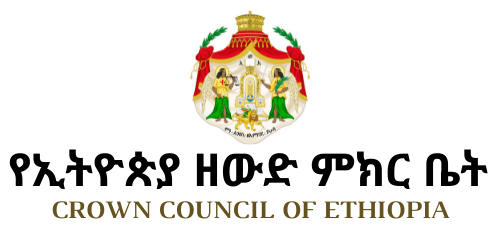The Ethiopian Crown Council, the constitutional body which represents the exiled 3,000-year-old Solomonic Crown of Ethiopia, today said that it was “a grave mistake” for Ethiopia to call on Iran to help mediate the current conflict between Addis Ababa and Asmara. “It can only lead to grave consequences for the future unity and stability of Ethiopia,” Crown Council President Prince Ermias Sahle-Selassie Haile-Selassie said.
Prince Ermias, the grandson of the late Emperor Haile Selassie, was commenting on Iranian news agency reports which said that Ethiopian Council of People’s Representatives Speaker Dawit Yohanes had today invited Iranian mediation efforts to resolve the crisis between Ethiopia and Eritrea. The Ethiopian Speaker had apparently made the remarks during a meeting in Addis Ababa with Iranian Ambassador Hussein Rajabi.
“All attempts at external mediation have thus far failed,” Prince Ermias said, “and now it has been suggested that Iran, which has been actively attempting to influence events in the Horn of Africa since 1979, should be invited into our affairs. This is untenable.”
“The Ethiopian Crown Council has, since the beginning of this conflict urged both sides to consider mediation and conflict resolution mechanisms which stay within the family of Ethiopic-speaking peoples. This has not yet even been attempted, and now Speaker Yohanes has apparently suggested inviting in a country which has made no secret of its wish to radicalize our region.”
“This does not mean that Ethiopia should treat Iran as an enemy, but it is clear that Iran is not a suitable candidate for a role in mediating the conflict.”
Prince Ermias continued: “The invitation for Iran to mediate in our problem is playing into the hands of the radicals, the same radicals who wish to see Ethiopia alienated from the main body of the world’s trading nations; the same radicals who wish to see Ethiopia dis-united and even dismembered.”
“Iran has been the major ally of Sudanese radical leaders such as Dr Hasan al-Turabi, who has advocated the dismemberment of Ethiopia even in recent months. Iran and Sudan have gone hand-in-hand in promoting radical religious politics in Africa, posing a major threat non only to moderate Ethiopian Muslims, but to moderate Muslim governments throughout Africa and the Middle East.”
“We have seen that in every arena in which Iran has become involved in recent years that religious polarization occurs. We do not want that for Ethiopia. In Ethiopia, religious tolerance and freedom — and an absence of religious radicalism — have been our strength.”
The Council President said that the ill-considered statement by Speaker Yohanes was typical of the drift and lack of a sense of national unity which has marked the current political era in Ethiopia.
“Ethiopia and the greater family of Ethiopic-speaking peoples must rally around symbols of unity, and build a sense of common purpose, ending conflict through mutual respect and greater sense of Ethiopianness. Ethiopian common objectives need not in any way interfere with the regional, ethnic or religious differences in our community. But we need to retain a strong sense of unity in the face of external threats which are mounting daily.”








